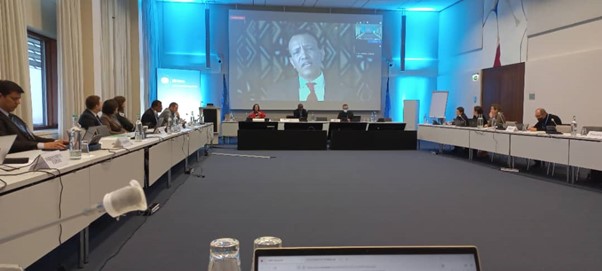The Program Manager for GWPEA, Mr. Gerald Kairu was appointed as a member of the Intergovernmental Working Group (IWG) on Drought of the United Nations Convention to Combat Desertification (UNCCD). The IWG was established at the UNCCD’s 15th Session (COP15) during the triennium 2022-2024, building on the work of the first IWG that carried out its work from 2020-2022. The IWG on drought is one of the subsidiary bodies of the United Nations Convention to Combat Desertification (“UNCCD” or “Convention”) and its aim is to discuss options on how the UNCCD can address drought within the framework of the Convention. Overall, as part of their terms of reference, the IWG will present its findings and recommendations to Parties for their consideration at the sixteenth session of the UNCCD Conference of the Parties (COP16) to be held in Saudi Arabia in October 2024.
The IWG held its first meeting on 29-30 November in Bonn, Germany, to review and analyze reports which came out of the first IWG on Drought, as well as other relevant documents. The meeting also identified and evaluated options, including, inter alia, global policy instruments and regional policy frameworks, linking, where relevant, to national plans, as appropriate, to effectively manage drought under the Convention, including supporting a shift from reactive to proactive drought management.
As provided by the COP15 decision, the IWG comprise the Parties, international organizations, independent experts and CSOs. The IWG is composed of 27 members consisting of three representatives nominated by each of the regional groups. These include the five regional implementation annexes (Africa, Asia, Latin America and the Caribbean, Northern Mediterranean, and Central and Eastern Europe); the European Union and its members states as well as the group known as JUSCANZ (Japan, the United States, Canada, Australia, and New Zealand.) Additionally, the IWG includes two representatives from civil society organizations (as observers); two representatives from international organizations that work on drought; and two independent experts.
The IWG discussed and presented the recommendations to the UNCCD secretariat for follow up. In this regard, the IWG identified legally binding and non-binding options for which elements, processes, institutional arrangements, and their mechanisms for establishment should be detailed with the support of the UNCCD secretariat.
IWG will convene at the next sitting (TBD) to review the above options and detail justifications as well as outline the possible elements, processes, institutional arrangements, and mechanisms for establishment for each policy option building on the UNCCD secretariat considerations.
